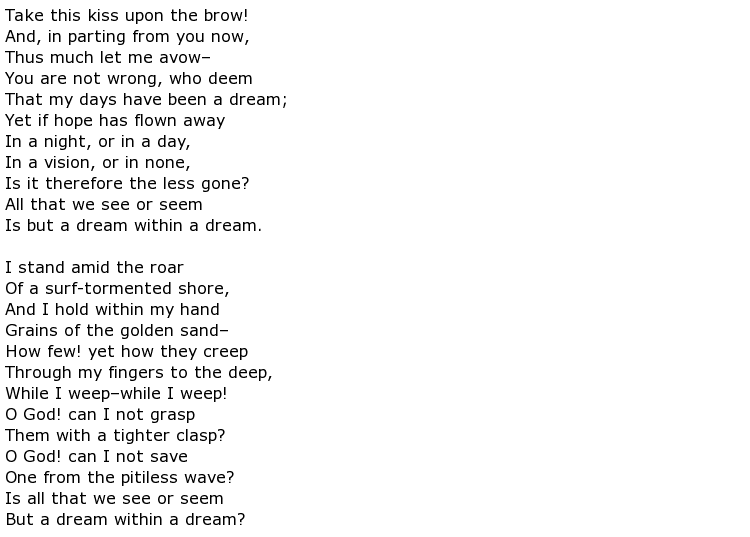Poems That Rhyme Biography
Source(google.com.pk)
Poetry that rhymes relays a message through the music of the spoken word. Their power is in their ability to get us caught up in the music so that we will let down our defenses and consider the message that the poem has to offer. Sometimes poets use rhyme as a tool to show the humor in the message they are trying to convey. Traditional poems are written in rhyme to help to add a musical element to a reading. A rhyming poem brings out the joy that can be had in appreciating the music in words.
Edmund Clerihew Bentley (1875-1956) is remembered mainly for his classic detective story Trent's Last Case and for the humorous verse form that was named after him - the clerihew. It was at the age of sixteen, while he was at St. Paul's School in London, that Bentley first started writing clerihews, as a diversion from school work. G. K. Chesterton, Bentley's life-long friend, was at St. Paul's at the same time, and he too wrote clerihews.
Here is one of Bentley's original clerihews from this period:
Sir Humphrey Davy
Abominated gravy.
He lived in the odium
Of having discovered sodium.
Bentley's first collection of verse in this vein was published in 1905 as Biography For Beginners. Further collections appeared in 1929 and in 1939. It was soon after publication of the first volume that the name CLERIHEW became applied to this particular form of light verse. What exactly is a clerihew? Frances Stillman in The Poet's Manual and Rhyming Dictionary defines it as 'a humorous pseudo-biographical quatrain, rhymed as two couplets, with line of uneven length more or less in the rhythm of prose'. Add to this, that the name of the subject usually ends the first or, less often, the second line, and that the humour of the clerihew is whimsical rather than satiric, and there you have a complete definition. Here is a brief selection of my favourite Bentley clerihews:
The people of Spain think Cervantes
Equal to half-a-dozen Dantes;
An opinion resented most bitterly
By the people of Italy.
The meaning of the poet Gay
Was always as clear as day,
While that of the poet Blake
Was often practically opaque.
I doubt if King John
Was a sine qua non.
I could rather imagine it
Of any other Plantagenet.
Dante Alighieri
Seldom troubled a dairy.
He wrote the Inferno
On a bottle of Pernod.
Nicholas Bentley followed in his father's footsteps with this splendid clerihew:
Cecil B. De Mille,
Rather against his will,
Was persuaded to leave Moses
Out of 'The Wars of the Roses'.
And, finally, here are three by Michael Curl:
Alexander Selkirk
Was too grand for hotel work.
He informed a maid
That he was monarch of all he surveyed.
James Joyce
Had an unusually loud voice;
Knightly knock eternally wood he make
Finnegans Wake.
E. C. Bentley
Mused while he ought to have studied intently;
It was this muse
That inspired clerihews.
Poems That Rhyme Poems About Love For Kids About Life About Death About Friendship For Him About Family Tumblr For Her About Nature
Poems That Rhyme Poems About Love For Kids About Life About Death About Friendship For Him About Family Tumblr For Her About Nature

Poems That Rhyme Poems About Love For Kids About Life About Death About Friendship For Him About Family Tumblr For Her About Nature
Poems That Rhyme Poems About Love For Kids About Life About Death About Friendship For Him About Family Tumblr For Her About Nature
Poems That Rhyme Poems About Love For Kids About Life About Death About Friendship For Him About Family Tumblr For Her About Nature

Poems That Rhyme Poems About Love For Kids About Life About Death About Friendship For Him About Family Tumblr For Her About Nature

Poems That Rhyme Poems About Love For Kids About Life About Death About Friendship For Him About Family Tumblr For Her About Nature

Poems That Rhyme Poems About Love For Kids About Life About Death About Friendship For Him About Family Tumblr For Her About Nature

Poems That Rhyme Poems About Love For Kids About Life About Death About Friendship For Him About Family Tumblr For Her About Nature

Poems That Rhyme Poems About Love For Kids About Life About Death About Friendship For Him About Family Tumblr For Her About Nature

Poems That Rhyme Poems About Love For Kids About Life About Death About Friendship For Him About Family Tumblr For Her About Nature

Poems That Rhyme Poems About Love For Kids About Life About Death About Friendship For Him About Family Tumblr For Her About Nature
Poems That Rhyme Poems About Love For Kids About Life About Death About Friendship For Him About Family Tumblr For Her About Nature

Poems That Rhyme Poems About Love For Kids About Life About Death About Friendship For Him About Family Tumblr For Her About Nature

No comments:
Post a Comment